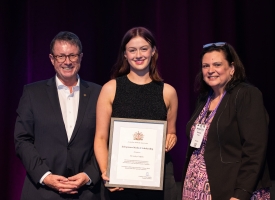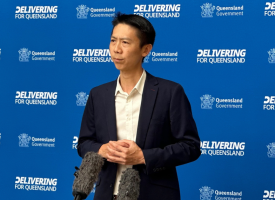Not cowboys: doctors encouraged to ‘give it a go’ and ‘go rural’
Not only are rural doctors resourceful but they are capable, competent, and keen to end the deficit narrative on rural health.

Not only are rural doctors resourceful but they are capable, competent, and keen to end the deficit narrative on rural health.
AMA National conference attendees should not have been surprised to learn that the rural doctors on the panel “Rural doctors are more resourceful than their urban counterparts, but why on earth do they need to be?” are passionate about rural practice and the communities they serve.
The panel was chaired by outgoing AMA Council of Rural Doctors (AMACRD) chair, Dr Marco Giuseppin, with Associate Professor and Rural Health Commissioner, Ruth Stewart; Dr Sarah Chalmers, President of the Australian College of Rural and Remote Medicine (ACRRM); Dr Daniel Wilson, a doctor in training in rural Victoria; and Ms Jasmine Davis, President of the Australian Medical Students' Association (AMSA).
Doctors in the session said rural doctors were resourceful and that with advanced skills across a range of disciplines, they offer high quality medicine to their patients and access to well-resourced hospitals and medical specialists. They established they were ‘positive disruptive innovators’ of rural general practice. This ethos embodies the best of rural generalist medicine, and they invited any practitioner who is uncertain about rural generalism as a career choice to ‘give it a go’.
The AMSA President, Jasmine Davis, spoke about her plans to be a rural generalist with advanced skills in mental health and the drivers which have contributed to this choice of career. Ms Davis pointed to her own regional background and the common experience of students returning to the regions to practice. She said Australia needs to do more to create rural doctors and that at present training is still focused entirely around metropolitan areas and universities. Increased investment in medical student training and rural exposure would ensure that more students would want to go rural, she said.
The Chair of AMACRD further argued the enthusiasm for rural practice would be enhanced if more rural generalists were able to teach students at the country’s medical schools.
Rural Health Commissioner, Ruth Stewart, questioned why services in regional, rural and remote areas were created by designs based on metropolitan needs and models. She also highlighted the National Rural Generalist Pathway and the importance of the multi-disciplinary rural health team and stressed that services need to be co-designed with the community where the services are to be delivered.
Doctors who wish to consider rural practice should visit the AMA website.
The Council of Rural Doctors proposed that improved data collection is needed to improve access to rural health care in rural Australia, with current methods of collection unreliable and inaccurate, making it impossible to develop policies and programs that support the right number of GPs to work where they are needed in rural areas. The council has called for the reinstatement of a government funded, independent national medical workforce agency and a review of the way data is collected to better reflect how many and where GPs are located.
For more information on this contact AMA policy officer, Yulia Coleman (ycoleman@ama.com.au).



